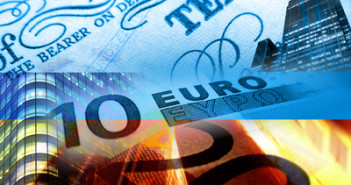EUR/USD continues to move higher, and has climbed to the high-1.34 range. The euro has gained over one cent so far this week. In the US, there was good news from the Federal Budget Balance, which posted a rare surplus in January. Eurozone Industrial Production rose sharply, easily beating the market forecast. Today’s highlights are US Retail Sales and Core Retail Sales.
EUR/USD Technical
- Asian session: Euro/dollar was quiet, touching a low of 1.3438, before consolidating at 1.3449. The pair has moved higher in the European session.
- Current range: 1.3360 to 1.34.
Further levels in both directions:Â 
 Â
Â










- Below: 1.3480, 1.34, 1.3360, 1.3290, 1.3255 , 1.3170, 1.3130, 1.3110, 1.3030, 1.30 and 1.2960.
- Above: 1.3588, 1.3690, 1.3740, 1.3860, 1.3915 and 1.40.
- The pair is showing strength, as it tests resistance at 1.3480. 1.3588 is stronger.
- 1.34 is now providing support. This line has strengthened as the pair trades at higher levels.
Euro/dollar gaining ground ahead of G-20 meeting – click on the graph to enlarge.
EUR/USD Fundamentals
- 2:00 US President Obama delivers State of the Union Address.
- 7:00 German WPI. Exp. 0.4%. Actual 0.3%.
- 10:00 Eurozone Industrial Production. Exp. 0.3%. Actual 0.7%.
- 13:30 US Core Retail Sales. Exp. 0.1%.
- 13:30 US Retail Sales. Exp. 0.1%.
- 13:30 US Import Prices. Exp. 0.8%.
- 15:00 US Treasury Secretary Jack Lew Speaks.
- 15:00 US Business Inventories. Exp. 0.3%.
- 15:30 US Crude Oil Inventories. Exp. 2.4M.
- 16:10 US FOMC Member James Bullard Speaks.
- 18:00 US 10-year Bond Auction.
For more events and lines, see the EUR/USD
EUR/USD Sentiment
- Euro Climbs Higher: With little fanfare, EUR/USD has been on the move throughout the course of the week. The euro has now gained about a cent against the US dollar since Monday, and has the 1.35 level in its sights. The euro has only recovered partially from last week’s sharp losses, but EUR/USD continues to be active. With the US releasing Retail Sales on Wednesday and Unemployment Claims on Thursday, we could see further movement if the readings are not in line with market expectations.
- Draghi upbeat on  Spain: ECB head Mario Draghi paid a visit to Spain on Tuesday, and addressed the Spanish Parliament in Madrid. Draghi had warm words for his hosts, declaring that “Spain is on the right trackâ€. He was upbeat about the Spanish banking sector, stating that the country’s banks have recovered and are now able to provide credit. Draghi dismissed the idea of establishing an exchange rate policy to keep the euro from rising too rapidly, saying that it was “inappropriate†for the ECB to aim for a particular target. He did, however, reiterate that the ECB is closely monitoring the recent fluctuations in the currency markets.
- G20 urged to avoid currency wars: The G20 meets in Moscow later this week, and an important topic on the agenda will be the issue of exchange rates. There has been a lot of volatility in currency rates lately, most notably, the sinking yen and the high-flying euro. There is mounting concern about currency wars, as countries are increasingly relying on monetary policy to kick-start their flagging economies. The Institute of International Finance, which is comprised of leading banks and financial institutions, has urged the G-20 to take steps to avoid the “possible discord on exchange ratesâ€. However, given the need to reach a consensus, analysts expect any statement on currencies from the G-20 to be mild in nature.
- EU Agrees to Budget Cuts: After marathon negotiations in Brussels, EU leaders have hammered out a deal to cut the EU budget, for the first time in the bloc’s history. The seven-year budget is being trimmed from the current 994 billion euros to 960 billion. The cuts are modest in scale, but nonetheless an important step in reigning in spending. The deal is a hard-fought compromise, as it reduces the budget while providing more funds for agricultural aid. Although all EU leaders have signed off on the agreement, it must be approved by the European Parliament, which is by no means certain. European Parliament head Martin Schulz has already stated that the budget will not pass in its current format, so we could see further developments in this matter.
- Hollande urges action over high euro: In a recent speech before the European Parliament, French President Hollande called on the Eurozone to set a “medium term†target for the exchange rate of the euro. Hollande’s remarks were a response to the high value of the currency, which is hurting French exports and the manufacturing industry. However, German officials were quick to state their opposition to such a move. German Economy Minister Phillipp Roesler summed up the view in Berlin, declaring that “the objective must be to improve competitiveness and not to weaken the currencyâ€. German Bundesbank head Jens Weidmann also weighed in on the issue, declaring that the euro is not overvalued and that devaluating the currency would lead to more inflation. While the German economy is showing recovery signs, the French economy continues to stumble, and Hollande is grabbing for any crutches he can lay his hands on, including a more competitive euro. The question of currency intervention will not disappear anytime soon, with heavyweights France and Germany at loggerheads over the issue.



